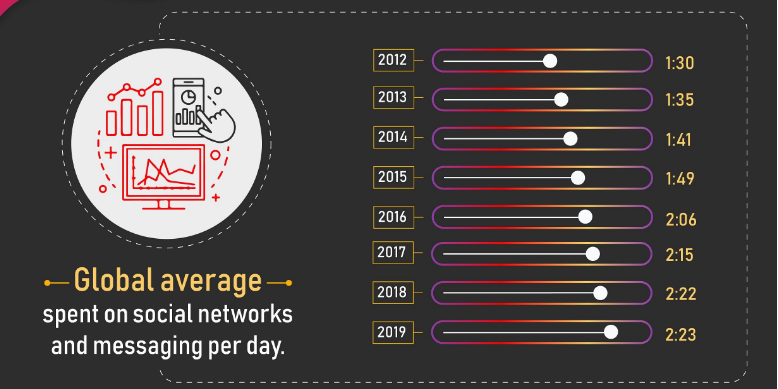 |
| (Ennis-O'Connor) |
Around 45% of the world’s population uses social media, totaling an average of 2 hours and 23 minutes a day per person (Ennis-O'Connor). Little did those people know, companies running these social media pages program their pages in ways that can be harmful. By taking and using data you posted when you sign up, make a post, send a picture, and much more.
Many people know that data is looked at in order to show relevant advertisements. But do they really know how the company is collecting their data? Or why the company really wants it?
Data is taken from social media accounts for many reasons: It can be sold to companies for advertising, profile building, and more in order to create revenue, it can also learn from the data, and sell specific things to specific people (Tufekci).
You may think that you can easily see these uses of “ad tracking” or other forms of data collection, as they are much easier to see. You look at a pair of shoes you would like to buy online, and 20 minutes later, you are receiving ads for the exact pair of shoes, generally from the website you just visited.
 |
| (Talbot) |
Sometimes, it’s not so easy to spot. “Facebook did an experiment on 61 million people in the US that was disclosed after the fact. So some people were shown, "Today is election day," the simpler one, and some people were shown the one with that tiny tweak with those little thumbnails of your friends who clicked on "I voted." This simple tweak. OK? So the pictures were the only change, and that post shown just once turned out an additional 340,000 voters in that election, according to this research as confirmed by the voter rolls” (Tufekci).
These people were not aware that this was even happening. And, does this make that big of a deal?
Well, facebook decided to repeat the project again in 2012, this time resulting in an extra 270,000 voters. Only 4 years later, the 2016 presidential election was determined by just about 100,000 votes. Therefore, does this mean companies such as facebook have control over huge things, such as the U.S. presidential election? (Tufekci).
In most cases yes, as their Artifical Intelligence and Algorithms are able to learn your political views by looking at your account information, posts, comments, and messages. They can then use that data to decide who they want to feed the impactful message to.
 |
| (Bonderud) |
In general, I think this process is unlikely to be stopped any time soon, and will most likely be used in worse ways than it has in the past. The only question is, how do we stop it from progressing to become too far? And what is too far for it to become illegal, or noticed by the masses, and eventually stopped?
Until people realize what the AI and algorithms are taking and using against them, they will continue to mindlessly use social media, giving out their information, their hobbies, their values, and eventually even more personal topics, pushing the boundaries more and more.
Works Cited
Bonderud, Douglas. "Artificial Intelligence, Real Concerns: Hype, Hope and the Hard Truth About AI." SecurityIntelligence , IBM, 30 Oct. 2018, securityintelligence.com/artificial-intelligence-real-concerns-hype-hope-and-the-hard-truth-about-ai/. Accessed 25 Nov. 2019.
Ennis-O'Connor, Marie. "How Much Time Do People Spend on Social Media in 2019?" Medium, 8 Aug. 2019, medium.com/@JBBC/how-much-time-do-people-spend-on-social-media-in-2019-infographic-cc02c63bede8. Accessed 25 Nov. 2019.
Talbot, David. "How Facebook Drove Voters to the Polls." MIT Technology Review, 12 Sept. 2012, www.technologyreview.com/s/429169/how-facebook-drove-voters-to-the-polls/. Accessed 25 Nov. 2019.
Tufekci, Zeynep. "We're building a dystopia just to make people click on ads." Ted, Ted Conferences , www.ted.com/talks/zeynep_tufekci_we_re_building_a_dystopia_just_to_make_people_click_on_ads/transcript. Accessed 25 Nov. 2019.
Good discussion of the issue and the significance of the power that such data gathering could possibly have. Is this as much of an issue in other countries, do you think?
ReplyDeleteIn certain countries, things such as this are more regulated, for example, the United Kingdom watches what goes out on their networks more so than the United States. However in countries like China block almost all content that would change views about a leader or any other person/thing that they want to protect. This is more extreme than a small experiment run by facebook.
DeleteThank you Eric for this insightful and informational blog post. I did not previously know about Facebook's involvement with the sheer number of voters turning out to elections. Do you think that Facebook should be regulated when it comes to politics?
ReplyDeleteWonderful blog Eric! I did not know about Facebook's involvement in determining some of the voter outcomes. What do you think will happen in 2020? How far will websites go, giving out personal information? Especially with the 2020 presidential elections right around the corner.
ReplyDelete